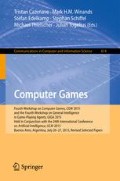Abstract
Automated agents in multiplayer board games often need to trade resources with their opponents—and trading strategically can lead to higher winning rates. While rule-based agents can be used for such a purpose, here we opt for a data-driven approach based on examples from human players for automatic trading in the game “Settlers of Catan”. Our experiments are based on data collected from human players trading in text-based Natural Language. We compare the performance of Bayesian Networks, Conditional Random Fields, and Random Forests in the task of ranking trading offers, and evaluate them both in an offline setting and online while playing the game against a rule-based baseline. Experimental results show that agents trained from data from average human players can outperform rule-based trading behavior, and that the Random Forest model achieves the best results.
Access this chapter
Tax calculation will be finalised at checkout
Purchases are for personal use only
Notes
- 1.
The baseline agent (referred to as ‘rule-based’) included the following parameters in all agents, see [16] for further details: TRY_N_BEST_BUILD_PLANS:0, FAVOUR_DEV_CARDS:-5.
References
Afantenos, S., Asher, N., Benamara, F., Cadilhac, A., Dégremont, C., Denis, P., Guhe, M., Keizer, S., Lascarides, A., Lemon, O., Muller, P., Paul, S., Rieser, V., Vieu, L.: Developing a corpus of strategic conversation in the Settlers of Catan. In: Workshop on the Semantics and Pragmatics of Dialogue SeineDial, Paris, France (2012). https://hal.inria.fr/hal-00750618
Asher, N., Lascarides, A.: Commitments, beliefs and intentions in dialogue. In: Proceedings of SemDial, pp. 35–42 (2008)
Breiman, L.: Random forests. Mach. Learn. 45(1), 5–32 (2001)
Choi, J., Park, J., Park, H., Park, J.I.: iHand: an interactive bare-hand-based augmented reality interface on commercial mobile phones. Opt. Eng. 52(2), 027206 (2013)
Cooper, G., Herskovits, E.: A Bayesian method for the induction of probabilistic networks from data. Mach. Learn. 9(4), 309–347 (1992)
Cozman, F.G.: Generalizing variable elimination in Bayesian networks. In: Workshop on Probabilistic Reasoning in Artificial Intelligence, pp. 27–32 (2000)
Criminisi, A., Shotton, J., Konukoglu, E.: Decision forests: a unified framework for classification, regression, density estimation, manifold learning and semi-supervised learning. Found. Trends Comput. Graph. Vis. 7(2–3), 81–227 (2012)
Cuayáhuitl, H., van Otterlo, M., Dethlefs, N., Frommberger, L.: Machine learning for interactive systems and robots: a brief introduction. In: 2nd Workshop on Machine Learning for Interactive Systems (MLIS), pp. 19–28. ACM (2013)
Dethlefs, N., Cuayáhuitl, H.: Hierarchical reinforcement learning for situated natural language generation. Nat. Lang. Eng. 21(3), 391–435 (2015)
Efstathiou, I., Lemon, O.: Learning to manage risk in non-cooperative dialogues. In: Proceedings of SEMDIAL (2014)
Efstathiou, I., Lemon, O.: Learning non-cooperative dialogue behaviours. In: SIGDIAL (2014)
Efstathiou, I., Lemon, O.: Learning non-cooperative dialogue policies to beat opponent models: ‘the good, the bad and the ugly’. In: Proceedings of SEMDIAL (2015)
Fürnkranz, J.: Machine learning in games: a survey. In: Machines that Learn to Play Games, Chapter 2, pp. 11–59. Nova Science Publishers (2000)
Georgila, K., Nelson, C., Traum, D.: Single-agent vs. multi-agent techniques for concurrent reinforcement learning of negotiation dialogue policies. In: Proceedings of the 52nd Annual Meeting of the Association for Computational Linguistics, Baltimore, USA, pp. 500–510, September 2014
Georgila, K., Traum, D.: Reinforcement learning of argumentation dialogue policies in negotiation. In: Proceedings of INTERSPEECH (2011)
Guhe, M., Lascarides, A.: Game strategies for the Settlers of Catan. In: 2014 IEEE Conference on Computational Intelligence and Games, CIG 2014, Dortmund, Germany, 26–29 August 2014, pp. 1–8 (2014)
Hastie, T., Tibshirani, R., Friedman, J.: The Elements of Statistical Learning: Data Mining, Inference and Prediction, 2nd edn. Springer, New York (2009)
Hiraoka, T., Georgila, K., Nouri, E., Traum, D., Nakamura, S.: Reinforcement learning in multi-party trading dialog. In: Proceedings of the SIGDIAL 2015 Conference, Prague, Czech Republic, pp. 32–41, September 2015
Kudo, T.: CRF++: Yet another CRF toolkit (2005). http://crfpp.sourceforge.net
Lemon, O.: Adaptive natural language generation in dialogue using reinforcement learning. In: Proceedings of SEMDIAL (2008)
Maddison, C.J., Huang, A., Sutskever, I., Silver, D.: Move evaluation in go using deep convolutional neural networks. CoRR abs/1412.6564 (2014)
McFarlin, M.: 10 great board games for traders. Futures Magazine (2013). http://www.futuresmag.com/2013/10/02/10-great-board-games-for-traders
Pfeiffer, M.: Reinforcement learning of strategies for Settlers of Catan. In: International Conference on Computer Games: Artificial Intelligence, Design and Education (2004)
Pietquin, O., Lopez, M.: Machine learning for interactive systems: challenges and future trends. In: Proceedings of the Workshop Affect, Compagnon Artificiel (WACAI) (2014)
Runarsson, T.P., Lucas, S.M.: Preference learning for move prediction and evaluation function approximation in Othello. IEEE Trans. Comput. Intell. AI Games 6(3), 300–313 (2014)
Shim, J., Arkin, R.: A taxonomy of robot deception and its benefits in HRI. In: Proceedings of IEEE Systems, Man and Cybernetics Conference (2013)
Szita, I., Chaslot, G., Spronck, P.: Monte-Carlo tree search in Settlers of Catan. In: van den Herik, H.J., Spronck, P. (eds.) ACG 2009. LNCS, vol. 6048, pp. 21–32. Springer, Heidelberg (2010)
Tesauro, G.: Temporal difference learning and TD-Gammon. Commun. ACM 38(3), 58–68 (1995)
Thomas, R., Hammond, K.J.: Java settlers: a research environment for studying multi-agent negotiation. In: Intelligent User Interfaces (IUI), p. 240 (2002)
Traum, D.: Extended abstract: computational models of non-cooperative dialogue. In: Proceedings of SIGdial Workshop on Discourse and Dialogue (2008)
Acknowledgments
Funding from the European Research Council (ERC) project “STAC: Strategic Conversation” no. 269427 is gratefully acknowledged. See http://www.irit.fr/STAC/. We would like to thank the following members of the STAC project for helpful discussions: Markus Guhe, Eric Kow, Mihai Dobre, Ioannis Efstathiou, Verena Rieser, Alex Lascarides, and Nicholas Asher.
Author information
Authors and Affiliations
Corresponding author
Editor information
Editors and Affiliations
Rights and permissions
Copyright information
© 2016 Springer International Publishing Switzerland
About this paper
Cite this paper
Cuayáhuitl, H., Keizer, S., Lemon, O. (2016). Learning to Trade in Strategic Board Games. In: Cazenave, T., Winands, M., Edelkamp, S., Schiffel, S., Thielscher, M., Togelius, J. (eds) Computer Games. CGW GIGA 2015 2015. Communications in Computer and Information Science, vol 614. Springer, Cham. https://doi.org/10.1007/978-3-319-39402-2_7
Download citation
DOI: https://doi.org/10.1007/978-3-319-39402-2_7
Published:
Publisher Name: Springer, Cham
Print ISBN: 978-3-319-39401-5
Online ISBN: 978-3-319-39402-2
eBook Packages: Computer ScienceComputer Science (R0)

